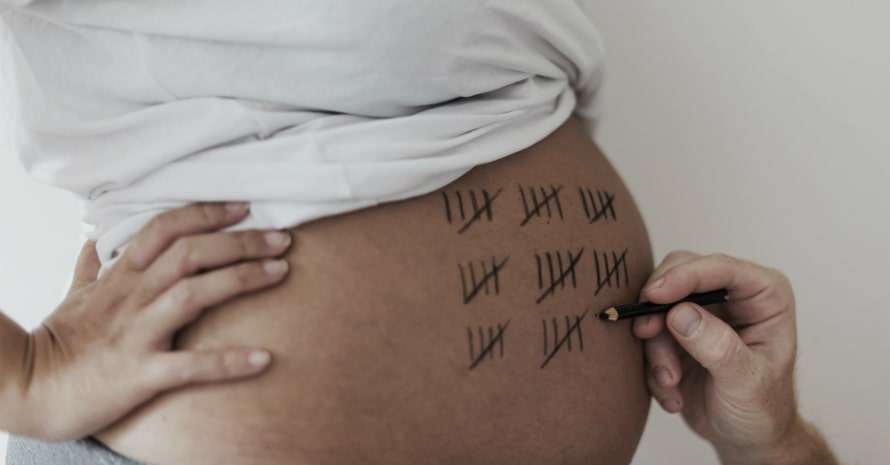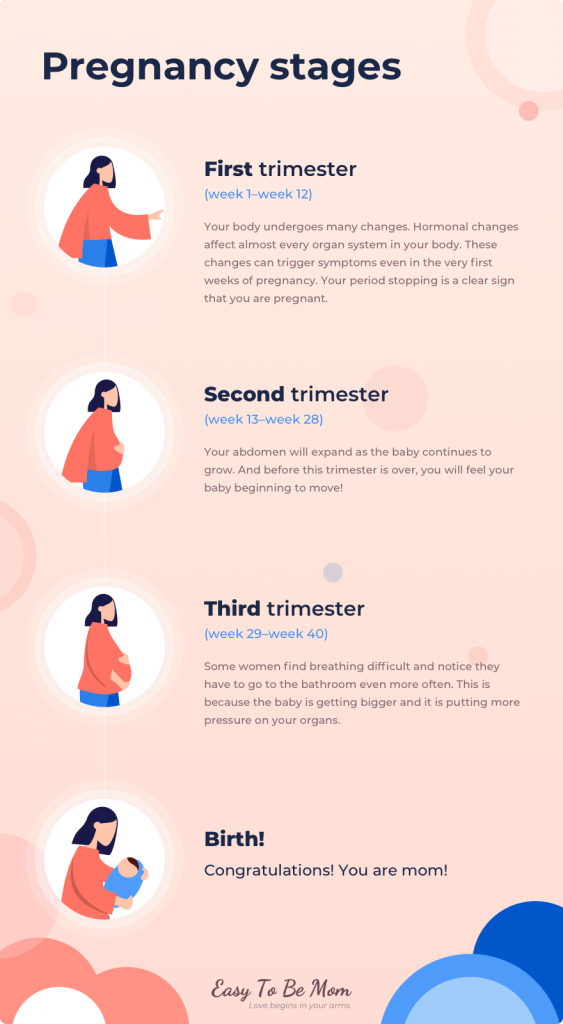Pregnancy by Trimester: Stages of Pregnancy by Trimester

If you are pregnant for the first time, or you have been looking forward to your first conception, you may be having many questions. For instance, you may be wondering what happens during the early stages of pregnancy, how to deal with the various changes, and the steps you should follow to ensure everything goes on well. Fortunately, many people have gone through the same situation, so you can learn a lot of tips from experienced moms.
Whether you are in the early stage of pregnancy or almost giving birth, you should be informed of what happens with your body. If you are interested in such details, you have come to the right place. I am the mother of a 2-year old son and aim to educate you on the symptoms you are likely to face while being pregnant and how to deal with all the challenges that come with this condition.
Besides, below, you will find information on the foods you should take while being pregnant, and how to ensure the baby is healthy. The analysis of pregnancy trimesters by week below should give you an idea of what to expect.
What Happens with You During All the Stages of Pregnancy?
By now, you may have heard the word “trimester.” It refers to the three phases that a pregnancy passes through from conception to birth. You may have questions like, how many trimester in a pregnancy? All the stages of pregnancy week by week take approximately forty weeks. If you wonder how long is the trimesters of pregnancy, read further. Some changes may take place during these forty weeks, and that can affect both the child and the mother. A week by week of pregnancy stage information below will help you to live through this period of your life without worries. So, what are the stages of pregnancy you need to know?

The Changes that Happen in the First Trimester of Pregnancy
In the first stages of pregnancy, you may not know about this condition if you don’t have experience in such things. How long is the first trimester of pregnancy? The period lasts from week 1 to week 12. Note that it is the most crucial time of the development of the baby. At this point, birth defects might occur, and there are higher chances of miscarriage than at the next stages, so you have to be more than accurate.
The first stage of pregnancy is conception. After that, the fertilized egg implants itself on the walls of the uterus. The survival of the embryo depends on the nutrients received from the mother. Embryonic cells grow through duplication.
From the third week, the embryo becomes completely implanted on the uterine wall. Many developmental milestones take place at this stage. For example, the crucial body organs, such as the heart, the nervous system, and the sexual organs begin to form. The developed placenta is responsible for the delivery of the crucial nutrients to the embryo that is in the process of growth. At these beginning stages of pregnancy, the amniotic sac is also developed. This sac gets later filled with amniotic fluid, which acts as a protective layer for the child in the uterus.
It is the implantation phase that triggers the earlier stage of pregnancy symptoms. The transformations in the mother’s body begin even before you find out that you are pregnant. This beginning period is often missed, but at this time, you can feel the initial symptoms of pregnancy.
You can also experience some physical signs in the first trimester pregnancy. If you are not sure about your condition yet, I recommend doing a self-administered pregnancy test at home (I will put few links to really good tests below). However, if you take the test within seven days after the missed period, it may give inaccurate results. The tests from doctors can provide accurate results even during this time.
[amazon box=”B001GXEHL8,B07JG44SPR,B01H7P7MHY” grid=”3″]The other early stages of pregnancy symptoms include feeling tired and lazy. The feeling is caused by the fact that the body is trying to cope with the physical changes. You may find yourself sleeping for longer compared to the way you used to sleep.
The hormonal changes also come with forgetfulness, feeling moody, and inability to focus for long. I recommended having a short nap during the day to recharge if it is possible. Alternatively, you should go to sleep earlier than usual. The good news is that your energy will be restored in the other pregnancy trimesters.
Women in their 1st trimester pregnancy also experience morning sicknesses that come with feeling nauseous and vomiting. These are the changes brought by the pregnancy hormones. Some smells or even foods can trigger the vomiting. By the second trimester, that feeling will go away.
What are the other changes in the first trimester of pregnancy?
- Urinating frequently
Because the embryo is growing in the uterus, your bladder is pushed, and this causes frequent urination. There are times you can experience urinal leaks when sneezing or coughing. Ensure that your personal hygiene is under control. - Feeling lightheaded
An increased blood rate is pumped in a bid to support the baby in the uterus at this pregnancy trimester. That is why you may feel dizzy. To curb the feeling, take nutritious meals frequently. - Changes in the breasts
As soon as you get pregnant, the hormones in your body begin to make the changes necessary for breastfeeding. The transformations make your breasts swelling and more tender. These changes take place up to stage 3 of pregnancy. - Other physical changes
The first physical change that you may experience is the veins becoming more prominent. It is because your heart has to work harder to cope with the increasing demand for blood in your body. Therefore, you may see noticeable blue veins on the breasts and belly. Spider veins can also develop on the face and arms.
Your skin also may become shinier. That is why you may have heard the phrase “pregnancy glow.” This “rosy” look appears as a result of the extra oil produced by your hormones and the increased circulation of blood.
Precautions to Take During the Pregnancy First Trimester
As mentioned before, it is a critical stage in the development of the baby. The first thing you need to avoid is alcohol. You should know that everything you take affects the baby. Alcohol has negative effects on the development of the child’s brain.
Some medications can affect the development of the fetus. Recreational drugs are on this list as they can lead to miscarriage. Before you take any medicine, I strongly advise consulting your doctor.
There are more 1st trimester of pregnancy do’s and don ts. For instance, you should avoid smoking as it prevents adequate oxygen from getting to the baby. Moreover, you increase the chances of toxic substances being transferred to the unborn child. Ensure that you get the right vaccinations at this stage.
Do you know what foods to eat pregnancy first trimester? You need a healthy diet at this stage of pregnancy. Always ensure the meal you take contains fresh vegetables, and the fruits you eat are clean. Add sweet potatoes to your diet as they contain vitamin A, which aids in the development of the fetus. For useful minerals and essential oils, eat fish and other seafood.
There are foods you should not eat to avoid diarrhea in the first trimester of pregnancy, as well as other complications. These include the foods that you are uncertain about how long they have stayed raw, such as meat, improperly stored foods, and those with high sugar content. When you are craving for a certain food, and you are unsure if it is healthy or not, consult your doctor.
What Happens in 2nd Trimester Pregnancy?
When the first trimesters of pregnancy are over, the second one sets in. How long are the trimesters of pregnancy? The periods differ. While the second trimester can take 13 weeks for some women, it can be 14 weeks long for others. That means it goes up to week 26 or week 27 of the whole pregnancy period.
In the 2nd pregnancy trimester, the baby continues to grow. The growth is now rapid with the development of critical organs, such as the lungs and the blood system. However, the fetus still can’t survive if put outside the mother’s body. The independent growth of the fetus is only possible after week 24.
At this point, the baby can also be seen through an ultrasound. During week 20, the ultrasound can tell an approximate delivery date. Movements of the baby can be felt after week 19, although some women may feel them earlier.
What are the specific changes the child goes through after the pregnancy ist trimester is over? From week 16, the baby’s face that resembles that of an adult human can be seen. For example, there is hair on the baby’s head, and the child can hear your voice.
Between weeks 17 and 20, the baby begins to develop the antibodies. Also, at this time, the eyelashes appear. The legs also get strength and can now move faster. By the time it gets to week 20, the baby is close to half the size of a newborn. The outline of the baby can be seen on the abdomen in week 26.
Changes continue in your body, as well. Because the child is in the process of growth, your belly also increases in size as time goes by. At this trimester of pregnancy, the discomforts you had in the earlier trimester reduce. For instance, the cases of morning sicknesses become minimal.
The pregnancy weight gain by trimester becomes rapid at this point. Therefore, it is an excellent time to start creating good conditions for the child. You can begin by wearing maternity clothes so that you can give your belly enough space.
What happens to the breasts? Although the level of tenderness may not be comparable to what you experienced in the first fourteen weeks, their growth continues. It is caused by the fact that the milk glands are becoming bigger. These are the changes that happen in preparation for breastfeeding. Additionally, the skin around your nipples becomes darker. In some cases, you may notice colostrum leaking from the breast nipples.
What else happens during this trimester in pregnancy? The growth of your body causes the skin stretching and becoming taut. Therefore, you may notice stretch marks mostly around your breasts and belly. Although stretch marks are among the common conditions, not all pregnant women experience them.
At this point, it is crucial to talk to your doctor and get directives on the healthy weight to have. Additionally, it is essential to ensure that your skin is properly moisturized. The good news is that the stretch marks will become less prominent and finally disappear entirely after you give birth to a child.
What other changes to expect in your skin during the second trimester pregnancy? The skin around the belly may become itchy. You may also become more sensitive to the rays of the sun. To protect your skin, apply sunscreen on open body parts when going out on hot days. Also, a dark line may run from the middle of the belly through the navel to your pubic area.
Some pregnancy by trimester chart models mention other changes in the body you may expect. These include:
- Leg pain
When asleep, you may feel some pain in the legs. These are called leg cramps. Experts say that such pain can be caused by the pressure exerted on the blood vessels because of the baby’s growth. As a precaution, do not sleep on your back. Instead, rest on your side. Consult your doctor in case the condition becomes severe. - Increased puffiness
The second trimester pregnancy also comes with swellings on different body parts, such as face and hands. This is a sign that the body is trying to retain fluid that can be used by the baby. At the same time, the rate of blood circulation becomes slower. - Joint pains
Because your belly is growing, your back supports the additional weight. The pain may increase during the third trimester of pregnancy, and you may begin feeling it in the hips and pelvis. However, the body bones are prepared for the coming child, and you don’t have to worry about it. You also may feel stomach pains because the uterus is growing. Headaches second trimester pregnancy are also common for many women.
As you approach the third trimester pregnancy, you may notice that the movements of the child become more rapid. It may make you feel uncomfortable. From the pregnancy trimester chart, it is also common. However, consult your doctor for finding the way of dealing with the movements that cause you much pain.
What Are the Specific Precautions to Take at This Point?
As you go through the stages of pregnancy month by month, you should always be cautious about the best conditions for you and your child. As you may be feeling better at this stage, it is easy to forget the things you need to do.
To move through the weeks of pregnancy in trimesters, ensure you keep the body hydrated. Avoid vigorous exercises and do mild workouts like walking and swimming instead. To prevent the baby from getting infections, you should also go for regular dental checkups. However, it is crucial to consult a doctor during all the stages of pregnancy.
What Happens During the 3rd Trimester Pregnancy?
By now, you already know how many trimesters in a pregnancy make up the whole period. The third trimester is the last part of this condition. At this point, the first trimester pregnancy symptoms are fading away.
The third trimester covers the last three months of the pregnancy. At this time, the baby develops and prepares for birth. The baby can now perceive sounds and respond to them. Sex organs also develop at week 40. The scrotum of the male child contains the testicles, while the female baby develops labia majora.
As a mother, there are many things you are going to experience during the pregnancy trimester by weeks. Here is a highlight:
- Frequent shortness in your breath
Because the baby is still growing, the uterus may cause the diaphragm to be pressed. When it happens, you may find it hard to breathe. As a result, a flight up the stairs may be hard. The strategy is to ensure that you move slowly. Moreover, you should always sit with your legs straight so that you can create more space in your abdominal areas. If you feel extreme discomfort at any of the different stages of pregnancy, consult your doctor. - The need to urinate regularly
As you move towards the end of the trimesters in weeks of pregnancy, the baby begins to move lower towards your pelvic area. As a result, the bladder is pressed even more, and you feel the urge to urinate frequently. A panty liner can help in such situations. You may also feel upper stomach pain during pregnancy 3rd trimester. - Contractions
Winding down the pregnancy trimesters by weeks also means that you will soon begin to feel false contractions. That means your body gets prepared for labor. As you move closer to the delivery, the contractions become more painful. Follow the pregnancy trimester by week chart to ensure labor does not begin when you are not prepared.
The Things to Prepare at This Critical Stage
3 trimesters pregnancy is now almost due. You should begin preparing what you need for the baby. Ask your doctor how to make yourself more comfortable in labor, the techniques you can use to relax, and the appropriate exercises that can help you to stretch the body. Moreover, think about the things you would like to do in labor and ways to take care of the baby.
I recommend purchasing all the items you will need during delivery beforehand so that you do not overspend on the due day. Towards the end of the pregnancy trimesters weeks, you should prepare the child’s clothes so that you don’t get overwhelmed on the day you need them.
At what stages of pregnancy do you know that you are almost approaching labor? You will notice the contractions becoming more frequent. The water will also break, and you will notice the mucus discharge. Some women experience back pain third trimester pregnancy.
Are You Prepared? Save the Right Information
At this time, you should already know what’s the first trimester of pregnancy. There are many changes in the various trimesters of pregnancy that you should keep up with. Do not confuse a symptom of a different stage of pregnancy with another. Adequate knowledge will help you to move conveniently through trimesters in pregnancy.
However, you should know that the symptoms that are experienced by one person may vary for another. The same applies in the case of labor pain. One woman may experience a more intensive pain than another. Therefore, you should talk to your doctor if you notice anything unusual in your condition. For example, intense headaches in the second trimester of pregnancy is a sign that you should see a doctor. Can you still ovulate in the early stages of pregnancy? Although such cases are rare, they may happen.
Being pregnant, you get a new experience accompanied by emotional changes and periods of uncertainty. Even if you do not know everything yet, and keep asking questions like ‘the first trimester of pregnancy is how many weeks exactly?’, staying in touch with your doctor will keep you informed. Is it your first pregnancy? If you’ve already given birth, please tell us about your trimesters pregnancy challenges? Share your thoughts with me.







